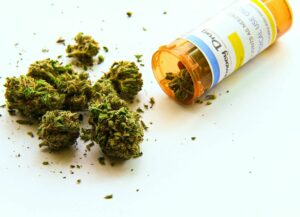Since the early 2000s, our knowledge on the gut microbiome has soared: We now know that microbes in our digestive system can influence our immune response, metabolism and even our mental health.
Given that our gut health seems to be interconnected with many systems in our body, it makes sense that the endocannabinoid system (ECS)—and the components that work on it, like cannabis—can affect our gut microbiome as well.
FOLLOW US ON FACEBOOK & INSTAGRAM
The Connection Between the Endocannabinoid System & the Gut Microbiome
The network of receptors in our body that make up the ECS plays a key role in a number of life processes like eating, sleeping and handling stress. Cannabinoids, like tetrahydrocannabinol (THC) and cannabidiol (CBD), found in cannabis act on this system to produce therapeutic effects such as pain and stress relief. Our bodies also make cannabinoids that attach to this system; they’re known as endogenous cannabinoids, or endocannabinoids, and the two that are most studied are anandamide (AEA) and 2-arachidonoylglycerol (2AG).
Both cannabinoids from cannabis and those made by our bodies, attach to receptors in the endocannabinoid system. The two receptors that are the most well-studied and prevalent are CB1 and CB2.
Studies show that microorganisms in the gut can control levels of endocannabinoids by influencing different parts of the endocannabinoid system, including the CB1 receptor, and the enzymes that breakdown AEA and 2AG.
Changes in the gut microbiome via high-fat diets, prebiotics, probiotics and antibiotics can also alter the endocannabinoid system in various ways—for example, by changing how CB1 and CB2 receptors are expressed, or altering endocannabinoid levels.
RELATED: MARIJUANA, GUT HEALTH AND THE BRAIN
It’s apparent that the gut microbiome and the endocannabinoid system are linked in some way, though more research needs to be done to figure out exactly how—and studies are already underway.
THC Prevents Weight Gain & Negative Changes in Gut Microbiota
To further explore how the endocannabinoid system and the gut microbiome are interconnected, scientists are studying cannabis’s effect on mice.
A 2015 study by researchers in Canada set out to find how diet combined with daily administration of THC would affect the weight and gut microbiota of mice. Researchers gave mice either a lean or high-fat diet, along with THC or a placebo daily for a total of six weeks.
At the end of the study, they found that mice fed a high-fat diet without THC gained up to 4 g of weight—that’s a lot for a tiny mouse: about a 20% increase in body mass. Meanwhile, the mice on the high-fat diet with THC didn’t gain any weight on average. The mice on the lean diet didn’t gain any weight either—regardless of whether they consumed THC.
The researchers also looked at gut microbiota in the mice. Scientists already know that obese and diabetic mice have different microbiota compositions than their healthy counterparts do—the former tend to have higher levels of bad, or harmful, bacteria in their system relative to good bacteria. This imbalance is in turn associated with how the body metabolizes fats. A higher ratio of bad bacteria can activate enzymes that encourage the storage of fat in fat cells, thereby causing weight gain.
In the mice fed a high-fat diet with THC, the imbalance—more bad vs. good bacteria—was prevented, though the reasons why are still a mystery.
In another interesting twist, mice on the high-fat diet with THC also had increased levels of a prebiotic called Akkermansia muciniphila in their guts than the mice on other regimens did—even the ones fed a lean diet. In other studies, the addition of Akkermansia muciniphila in mice led to an increase in CB2 receptors. These receptors help control inflammation in the body. The prebiotic also limits the amount of fat that mice gain and improves how fat is metabolized.
While we don’t exactly know how the endocannabinoid system and our individual gut microbiotas interact, it’s clear that there’s a connection, and that this connection could play a role in how we treat obesity, diabetes and likely many other conditions.
Photo credit: Warren Wong
If you’re new to cannabis and want to learn more, take a look at our Cannabis 101 post. HelloMD can help you get your medical marijuana recommendation; it’s easy, private and 100% online.






